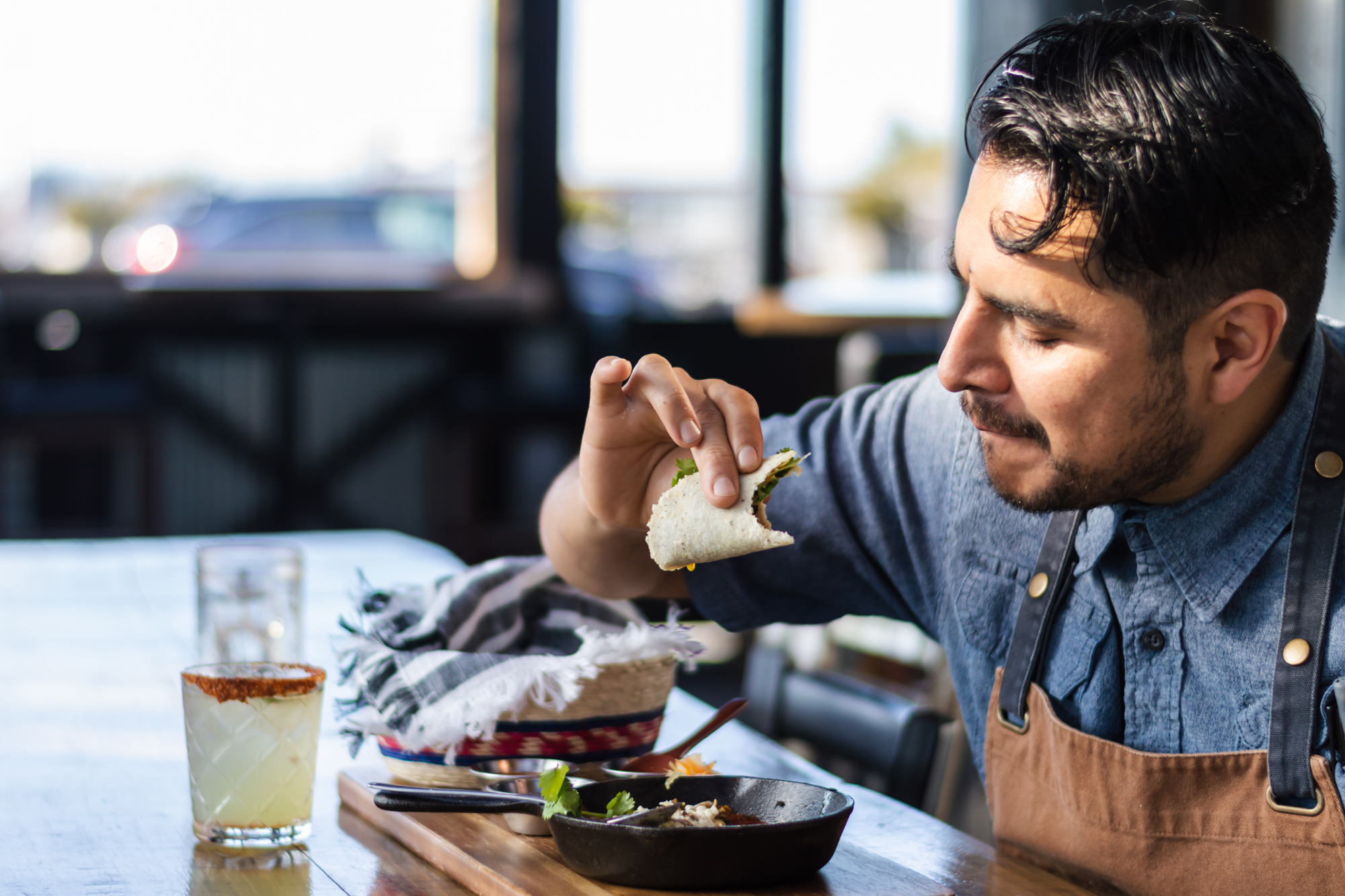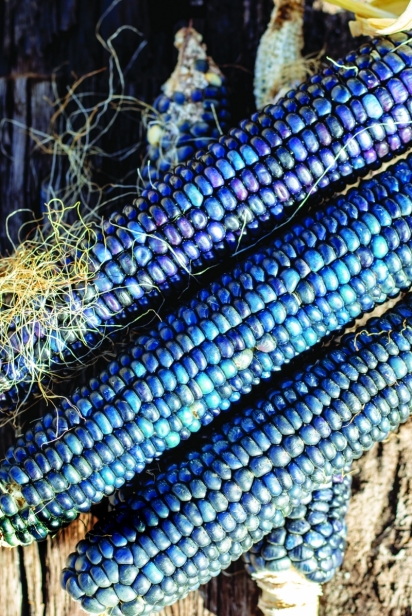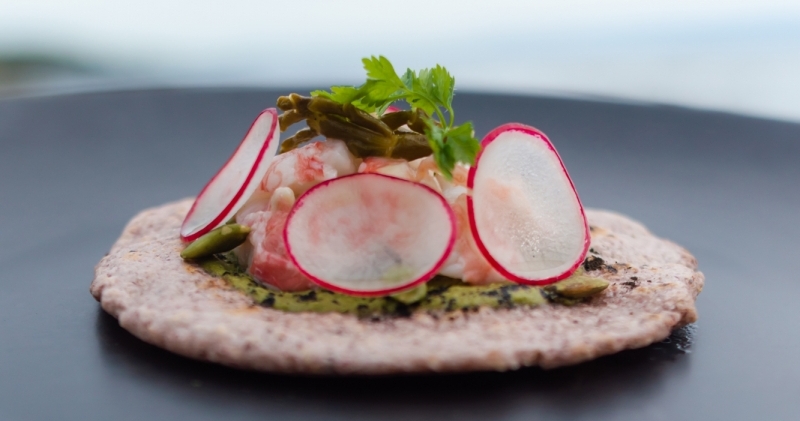Chef Israel Alvarez's Food Tells an Ancient Story
In 2008, Israel Alvarez left his home in Mexico and moved to Canada for a life far from everything he knew: his friends, family, a secure job at a well-known restaurant—and escalating crimes related to the illegal drug trade.
Then he heard from an acquaintance about a restaurant in Edmonton, Alberta, where a job was waiting for him if he wanted it. While he knew nothing about the province or its capital, he knew it was far removed from the drug syndicates that were turning his hometown into a war zone. So he packed his bags and headed north.
If you ate at Original Joes in the Terwillegar neighbourhood of Edmonton between 2008 and 2012, there’s a very good chance that Israel Alvarez prepared your chicken tenders and taco salad.
“I’d never heard of a taco salad before or operated a deep fryer,” he says. “This was very different from what I was used to doing.”
In Mexico, he had worked as the sous chef at Pujol, a restaurant that consistently rates in the top 50 best restaurants in the world. For eight years, Alvarez—called “Tio” (uncle) by staff out of respect for his skill level and management style—helped put Pujol on the culinary map.
Now, he assembled taco salads and cooked burgers on a flat top grill.
Alvarez says he got through that time by dreaming of the day he would own his own restaurant: one where he would create traditional Mexican dishes using the culinary techniques he honed from working in Spain and France and with principles gleaned under the mentorship of Enrique Olvera at Pujol.
While Mexican restaurants are common enough across Canada, Alvarez vowed his would be different. His menu would revolve around corn, the backbone of Mexican cuisine—but not the standardized, genetically modified corn that has flooded the market since the 80s when the North American Free Trade Act (NAFTA) came into being. Alvarez would make his tortillas from non-GMO, organic, heritage Mexican corn; and what’s more, he would follow the way of the ancients and nixtamalize the corn before grinding it into the flour needed to make dough for his tortillas.
Tortillas made from nixtamalized corn flour are worlds apart from mass-produced tortillas made out of industrialized masa harina (corn flour). The process of nixtamalization—boiling the kernels, soaking them in calcium hydroxide (also known as slaked lime or pickling lime) and then grinding the kernels into flour—increases the corn’s nutritional value and makes it easier to digest. The resulting tortilla is soft and chewy but doesn’t fall apart when loaded with fillings. It has a robust flavour, and it permeates the air with a sweet and earthy aroma as it puffs on the grill.
Alvarez likens store-bought tortillas made from industrialized corn flour to instant mashed potatoes from a box and nixtamalized corn flour tortillas to mashed potatoes made with real potatoes, butter and fresh milk.
“Tortillas made from nixtamalized corn have soul,” he says. “You can smell the cornfields. Each tortilla has history and heart. They have the flavour of my memories.”
In 2016, Alvarez tested his creations on Edmontonians with pop-up dinners called “Comal”, named for the large round griddle used in Mexican cooking. While people raved about his food, embraced the concept and appreciated the work that went into nixtamalizing corn, Alvarez was unable to secure enough financial backing to open a restaurant. Maybe it was timing. Maybe it was location. But after 10 years of working in various restaurants, teaching cooking classes and hosting pop-ups, Israel Alvarez felt it was time for a change.
He found inspiration and hope at the Breakwater Café & Bistro in Victoria after a job interview with the bistro’s chef, David Furlonger. The two men share the same ideology when it comes to food: source from local producers as much as possible and work with what the land and sea provides. A month later, Alvarez left Edmonton and headed west, corn grinder and optimism in tow.
Furlonger shared his market explorations and foraging knowledge with Alvarez, who eagerly experimented using Pacific Northwest ingredients in his Mexican recipes. While the Island provided spectacular bounty, the vital component—the jewel-toned heritage corn needed to make nixtamal tortillas—had to be sourced from Oaxaca.
In the summer of 2019, Alvarez featured his tacos in the bistro’s ground-level space called the Tasting Room.
Warm tortillas in shades of blue, red and white cradled traditional Mexican and local ingredients: foraged mushrooms, cilantro and house-made crema; sockeye salmon cured in mezcal and scattered with nasturtium leaves; B.C. prawns with charred cucumber and stinging nettle mole; albacore tuna spiked with pickled bullwhip kelp and drizzled with chipotle-infused garlic mayo.
Visually stunning and expertly executed, the tacos were a hit.
At his Comal pop-ups in Edmonton, Alvarez told the story of his culture through what was expressed on the plate—Alberta beef short ribs nestled in Oaxacan mole, duck confit laced with cinnamon and orange. He does the same today, by marrying the influences of Mexico and Vancouver Island. No matter where he hangs his apron, Israel Alvarez’s mission remains the same: to share his culture through terroir. What people taste is hospitality at its best.
In March 2020, due to the COVID-19 pandemic, the Breakwater, like many restaurants, temporarily closed its doors. The future, according to Israel Alvarez, will be a time of reinvention for many.
“The pandemic has made me re-evaluate what is really important. It’s made me realize how much we have and how much we don’t need. Life doesn’t have to be fancy to be appreciated. There is so much beauty in what is simple.”
He may be speaking about life in general, but I’ve seen his food, I’ve eaten his tacos, and I’ve witnessed the effort he puts into creating his dishes. The reason Israel Alvarez’s food looks so beautiful and tastes so flavourful is because every ingredient—from cilantro to salmon—is treated with respect. Every ingredient is connected to someone who grew, nurtured or harvested that item to get it to that plate. Alvarez simply wants his food to tell their story.
When it comes to eating, there is nothing more beautiful than that.







